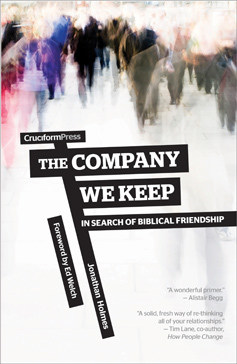 As a cofounder of Cruciform Press, I like to provide occasional updates on news and tell you about our more recent titles. One recent release focuses on a subject we often struggle with but don’t often talk about: friendship among Christians.
As a cofounder of Cruciform Press, I like to provide occasional updates on news and tell you about our more recent titles. One recent release focuses on a subject we often struggle with but don’t often talk about: friendship among Christians.
One of the most fundamental truths about the Christian life is that we were created for relationship. Yet many of us, even active church members, often struggle to form and maintain true, solid friendships. Then, we can compound our problems by being afraid to admit it. We readily imagine that if we don’t have such friendships, we must be deficient or unlovable. Partly this stems from a sense that genuine friendship should “just happen” among believers, as if it were our default setting as Christians, an automatic perk of conversion.
In The Company We Keep: In Search of Biblical Friendship, Jonathan Holmes wants to correct these and other false assumptions. “Deep and meaningful friendships don’t come easily—even within the church, and sometimes especially within the church. And because from time to time we all sense that things ought to be different, we can find the challenges of biblical friendship perplexing, frustrating, and discouraging.”
Church leaders are aware of this, and many have tried to fill the void. The current emphasis on small groups and accountability partners is one result. But programs can only put people together, they can’t build relationships. As the Pastor of Counseling at Parkside Church (led by Alistair Begg), Holmes even makes this telling observation: he has never once seen an accountability relationship work unless it was built on a pre-existing biblical friendship.
In chapter one of his book, Holmes clarifies what biblical friendship is and is not. He offers this working definition:
Biblical friendship exists when two or more people, bound together by a common faith in Jesus Christ, pursue him and his kingdom with intentionality and vulnerability. Rather than serving as an end in itself, biblical friendship serves primarily to bring glory to Christ, who brought us into friendship with the Father. It is indispensable to the work of the gospel in the earth, and an essential element of what God created us for.
Central to the entire book is this contention that friendships, however enjoyable and desirable, are never intended by God to be the end goal. This also means that The Company We Keep is not some baptized version of Dale Carnegie’s lessons in “how to win friends and influence people.” Rather, the book is all about how to glorify God in and through our friendships and, as a byproduct of that uniquely Christian pursuit, find a depth and quality of friendship not available by any other means.
After clarifying our understanding of biblical friendship, Holmes exposes the counterfeits, things we mistake for true biblical friendship. These include similar-stage-of-life or common-interest friendships, social-media “friendships,” and selfish friendships, the kind we pursue because of what we can gain personally. These are the sorts of things upon which the world bases its friendships. While some of these can be positive and enjoyable in a common-grace kind of way, Holmes’ burden is to give us a vision for friendship that is higher, better, truer, and explicitly God-centered; friendship that brings us joy and draws us close to others because it’s main focus is the kingdom of God.
In an especially helpful chapter, Holmes then explores what he calls the four marks of biblical friendship: constancy, candor, carefulness, and counsel. One chapter each is then devoted to the forging and protection of biblical friendships. Finally, the author delves into the purpose of biblical friendship, with an emphasis on the cultivation and display of unity among believers.
As Ed Welch asks in the Foreword, “Could there be anything more important [than friendship]? When we reflect on our lives, they are measured not by our incomes or good works, but by our relationships—by our friendships. This is true for everyone.”
If friendship seems harder to you than you think it should be, Jonathan Holmes offers valuable help. His book will make you think about friendship in ways you may not have considered before. This is an encouraging, practical, helpful treatment of an important subject, and should bear much fruit in its readers and in the church.
The Company We Keep is available at Amazon and directly from Cruciform Press.









